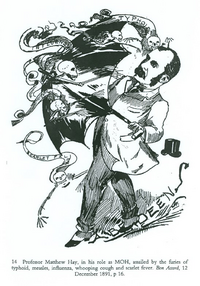Matthew Hay | |
|---|---|
 Professor Matthew Hay ... assailed by the furies of typhoid, measles, influenza, whooping cough and scarlet fever | |
| Born | 1855 |
| Died | 1932 |
| Nationality | |
| Alma mater | University of Edinburgh |
| Known for | Pioneer of medical education and public health |
| Scientific career | |
| Fields | Public Health |
| Institutions | University of Aberdeen Aberdeen City Council |
Matthew Hay (1855–1932) was a Scottish medical doctor and champion of Public Health. He was appointed Medical Officer of Health for the City of Aberdeen in 1888, a post he held until 1923. He was also Professor of Forensic Medicine at the University of Aberdeen.
Matthew Hay was born at Hill Head, Denny, Stirlingshire on 27 December 1855. His father was a colliery owner. Hay was academically gifted attending Dollar Academy before going on to Glasgow and Edinburgh universities, graduating from the University of Edinburgh Medical School with the degree of MB, CM with distinction in 1878. At Edinburgh he distinguished himself by winning the Ettles prize for medicine and the Goodsir Fellowship and worked as an assistant to Richard Fraser, professor of Materia Medica. In 1884 Hay was offered and accepted the chair of pharmacology and therapeutics at Johns Hopkins University medical school, Baltimore. He did not take up the positions because of a dispute with Johns Hopkins over his intention to continue treating private patients. Baltimore's loss was to prove to be Aberdeen's gain when Hay, aged 27, successfully applied for the Chair of Forensic Medicine at Aberdeen University.
Hay's career in Aberdeen was not limited simply to the lecture theatres of the University. In 1888, he was appointed the city's Medical Officer of Health. It was in his capacity as the Medical of Health that Hay made an important contribution to solving the public health issues of Aberdeen's working class housing problem through the promotion of the Aberdeen (Housing of the Working Classes) Improvement Scheme 1894.[1]
- ^ Aberdeen Inorovement Scheme Provisional Order Confirmation Act 1896 (59 & 60 Vict. c6)